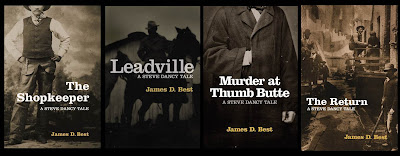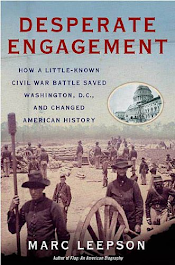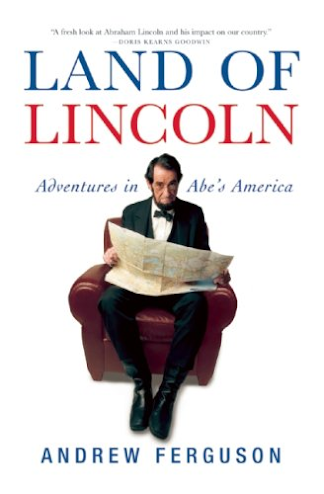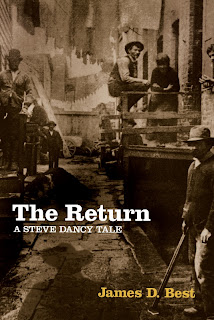Monday, August 15, 2022
Desperate Engagement by Marc Leepson
Thursday, July 21, 2022
Abraham Lincoln, by Lord Charnwood
Lord Charnwood published Abraham Lincoln in 1916. In order
to get a clearer perspective of the Civil War, it helps to read books from
multiple viewpoints. Lord Charnwood wrote only fifty years after the war,
bringing an almost contemporaneous perspective to his depictions. His biography
has the advantage of proximity but with enough time elapsed to dampen the
passions of the moment. More important, as an English depiction, it is a
simultaneously a distant point of view. It is a distance of more than nautical
miles. Lord Charnwood also brings the bias of English nobility to his
descriptions. This is exceptionally important in gaining an understanding of
the diplomatic imperative for both sides. The Confederacy desperately sought
European recognition of their legitimacy, while Lincoln did everything in his
power to deny international recognition and suppress arms and funding from
abroad. Lincoln’s success was arguably pivotal to eventually making victory
possible.
Abraham Lincoln, by Lord Charnwood can be a tough read. A
simple, declarative sentence is beyond the baron. This is partly due to the
style of the times and partly the way of academics who feel a need to qualify
every utterance. Once the reader adjusts to the wordily writing, nuggets of
rare perspective make the effort well worthwhile. For example, Thomas Jefferson
is not one of my favorite Founders and Lord Charnwood seems to have shared some
of my reservations. He also makes other political observations that an American
might be reluctant to express.
If you have an interest in the mid-nineteenth century,
Abraham Lincoln by Lord Charnwood can be an enlightening read.
Monday, March 14, 2022
LAND OF LINCOLN: ADVENTURES IN ABE'S AMERICA by Andrew Ferguson
This is a fun memoir of a modern-day search for the real
Abraham Lincoln. In childhood, Andrew Ferguson had been a Lincoln buff but had
developed other interests in adulthood. The enigmatic and “shut-mouth” Lincoln
provided pundits an open field for speculation. As a result, a plethora of
interpretations have been tossed around that purport to explain his
personality, beliefs, motivations, administration, family, and even sexual
orientation. Glorifying tributes stand beside hate filled censures. Ferguson trekked
across the country to get a fix on the man. He traversed the Lincoln Heritage
Trail with his family, visited major and not-so-major memorials, interviewed
Lincoln collectors, gawked at Lincoln impersonators, and talked to guides,
academics, and park rangers. Lincoln remained elusive, but Ferguson’s wit and
lively writing style kept the quest entertaining and educational … although the
reader may learn more about modern-day Americans than they learn about our
sixteenth president.
Sunday, February 27, 2022
The Lincoln Myth by Steve Berry
When writing a historical book, sometimes you need a recess from hard history. I thought The Lincoln Myth by Steve Berry would provide an appropriate break. Instead of relaxing, I found the book annoying. The Lincoln Myth interlaces Mormon history and a trendy premise about Abraham Lincoln into a modern-day thriller. The premise probably came from The Real Lincoln by Thomas J. DiLorenzo, a popular 2009 book that contended that the South had a right to secede, and the Civil War was unnecessary. DiLorenzo went further stating that eliminating slavery was not a goal of the conflict and only afterwards used as a justification. I believe this premise an over-simplification, but I’ll postpone explaining why until I review The Real Lincoln.
What drew me to the book was the Lincoln and Constitution history interwoven into the story. I wrote my own Lincoln mystery/thriller (The Shut Mouth Society) and a novelization of the Constitutional Convention (Tempest at Dawn), so I found it jarring to read Madison’s convention notes and finding material I knew wasn’t present. Berry had a viewpoint with little evidence to support that his viewpoint was correct, so he altered existing documentation and invented entirely new documentation. I objected less to the invented documentation because it disappeared with a novelist sleight of hand. Perfectly legitimate. Altering Madison’s notes, however, seemed lazy and unnecessary to support his plot. Berry was making a political point by modifying the historical record. If omitted, the plot could have moved along the same path without a jarring interruption that defiled Madison's notes.
Thursday, January 13, 2022
War on the Waters, James M. McPherson
With the exception of the Monitor vs. Merrimack (CSS
Virginia), naval battles get short shrift in Civil War books. McPherson
certainly fills that gap with War on the Waters, The Union and ConfederateNavies, 1861-1865. Land battles were certainly decisive, but the Union may have
lost the war without Gideon Welles and the Navy Department. McPherson even
makes a strong argument that Rear Admiral David Glasgow Farragut deserves to be
ranked with generals Grant and Sherman when giving credit for the Union
victory.
Inventions and innovations by both the Confederate States and the United States revolutionized naval warfare. Steam-powered ships, screw propeller driven ships, ironclads, submarines, weaponry, and naval tactics all made major advancement during those four years. By Appomattox, the United States owned the largest navy in the world, and arguably the most technologically advanced.
War on the Waters does an admirable job of describing blue
water and brown water (river) battles and in explaining the significance of
each clash. I found the battles that required cooperation between the Army and
Navy of particular interest. As an added bonus, International law on blockades
is more fully described than in other history books.
McPherson’s no nonsense writing style can sometimes verge on
dull, but he always pulls the reader back to the narrative in the nick of time.
I recommend this book to all those who have an interest in
the Civil War, naval battles, technology advancement, or military politics. War
on the Waters is informational and a good read.
(This is a research book for Maelstrom, a sequel to Tempest at Dawn.)
Wednesday, November 10, 2021
Bridge Across the Ocean, A Novel by Jack B. Rochester
I like fish out of water stories. The Steve Dancy Tales is about a New Yorker trying to survive the Wild West and Bridge Across the Ocean tells the story of New Hampshire bicycle entrepreneurs doing the deal of a lifetime in Taiwan.
Intellectual property thieves try to ruin the dream, but the real challenge is bringing the deal and a love relationship to fruition in a culture completely foreign to Yankees from New England. Bridge Across the Ocean delves deeply into the cycling sub-culture and presents a distinct perception of life and countryside when experienced from the saddle of a bicycle .
Will a love of cycling be enough to bridge the gap between American custom bike craftsmen and Taiwanese mass producers? Read the book to find out.
Wednesday, February 19, 2020
Roundup Magazine reviews No Peace
Now a married man, Steve Dancy hopes that his life will become one of normal, marital bliss. But if you've read any of the author's work, then you'll know it isn't likely to happen, especially when Dancy's friend, Jeff Sharp, appears on the scene. This author pens a riveting story, every page brimming with action and suspense.R. G. Yoho
 |
| Honest westerns filled with dishonest characters. |
Wednesday, November 20, 2019
Book Review -- How Literature Works by John Sutherland
Friday, September 13, 2019
Deluge Reviewed at jackboston.com
It’s to his credit that he focuses his attention on the human element of the deluge, rather than going all technical on the reader. We read as citizens, law enforcement, academia, politicians and outlaw gangs deal with the deluge. In the process, Best makes this a compelling—indeed frightening—story. Again and again I was impressed with Best’s characterizations and grasp of how profoundly a storm such as this can disrupt life. The potential power of water stayed with me for days. This is a highly recommended natural disaster thriller, written with acute attention to reality and little, if any, needless melodramatics.
 |
| Storms, politics and street gangs pummel California ... and that's not the scary part. |
Friday, June 28, 2019
New Review for the Shut Mouth Society
JackBoston.com has reviewed the Shut Mouth Society. Read the full review here:
The Shut Mouth Society was a great and unexpectedly satisfying read. I’ve read several (not all) of Jim Best’s Steve Dancy novels and enjoyed them, but this novel is considerably more sophisticated and, well, interesting. Kind of like Russian Kachinka dolls, its setting is contemporary but within that it’s a historical novel. Like any historical novel, fact is married to fiction, and in this book it all works well together: the story carries the day and you don’t really know or need to care if every single thing is factual.
Thursday, April 19, 2018
Wednesday, January 8, 2014
Can Novelist see the past better than historians?
Sunday, December 22, 2013
Examiner.Com reviews The Return
Tuesday, October 22, 2013
Buddies in the Saddle reviews The Return
Sunday, October 20, 2013
"Mike Reads" reviews Tempest at Dawn
Tempest at Dawn continues to be well received by readers and historians. At the time of this writing, and five years after publication, the Kindle version is still ranked #28 for books about the U.S. Constitution. 78 Amazon customers have reviewed the book for 4.5 stars, and 185 readers on Goodreads have given the book an average rating of 3.84.
I'll probably never again tackle a book as challenging as Tempest at Dawn, so it's gratifying that it still sells well and continues to receive attention from readers and reviewers. Thanks.
Wednesday, October 16, 2013
Book Review: Truman by David McCullough
Truman was an enjoyable read and a highly professional biography of one of our best presidents. Despite my grumblings, I read every word of this fine book and returned to reading it at every opportunity. I would highly recommend it … supplemented with other history books about this pivotal period in our history.
Sunday, October 13, 2013
What am I writing?
 |
| Cowboy City in Farmingdale New Jersey |
3. Shut up and write.
Thursday, October 10, 2013
Review of The Return by Western Fiction Review
Wednesday, September 11, 2013
Book Reviews—The good, the bad, and ...
 |
| Steve Dancy Tales |
Saturday, August 10, 2013
Busy with important stuff
At the end of the hour and a half lesson, she was auditioning to be a Roxy Girl.
On the book front, The Return just received its first Amazon review. Take a gander. It's a good review, of course, or I wouldn't link to it here.


















.jpg)
.jpg)




